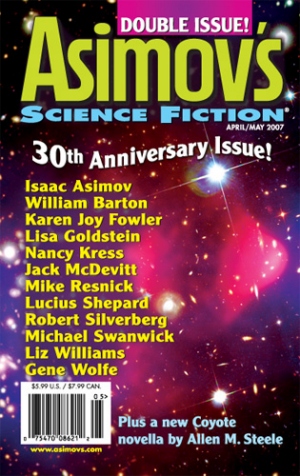Birthday Reviews: Karen Joy Fowler’s “Always”

Karen Joy Fowler was born on February 7, 1950. She began her science fiction career with the stories “Praxis” and “Recalling Cinderella,” both published in March, 1985. Her first novel, Sarah Canary, appeared in 1991. In addition to writing science fiction, Fowler wrote The Jane Austen Book Club, which was turned into a film.
In 1991 Fowler, along with Pat Murphy, founded the James Tiptree, Jr. Award to recognize speculative fiction that expands or explores the understanding of gender.
She has won the Nebula Award for Best Short Story in 2004 for “What I Didn’t See” and in 2008 for “Always.” Fowler won the World Fantasy Award for Best Collection in 1998 for Black Glass and again in 2010 for What I Didn’t See, and Other Stories. She won the 2014 PEN/Faulkner Award for We Are Completely Beside Ourselves, which was also shortlisted for the Man Booker Prize.
“Always” was originally published in the April-May 2007 issue of Asimov’s Science Fiction, edited by Sheila Williams. It was reprinted the next year in Year’s Best anthologies edited by Rich Horton and David G. Hartwell & Kathryn Cramer. Ellen Datlow included it in Nebula Awards Showcase 2009 and Fowler reprinted it in her collection What We Didn’t See, and Other Stories.
Set in 1938, “Always” is a sympathetic view of a cult colony on the California coast called Always. The cult leader, Brother Porter, has promised his followers eternal life. Fowler never fully addresses whether Brother Porter has really discovered the secret of immortality, or if he’s just a leader who’s found a way to fleece people and get sex. More important to Fowler appears to be an attempt to depict someone who has found faith in her beliefs, a faith which endures beyond the bounds of evidence.
Even as Fowler’s protagonist accepts the idea of eternal life, her depictions of the other inhabitants of Always shows the shortcomings of living forever. Winnifred is always complaining about her ailments, John is constantly nostalgic for his old life, Harry is always happy, and the protagonist, who entered Always as a young woman, is supplanted by Kitty, younger and prettier than she is.